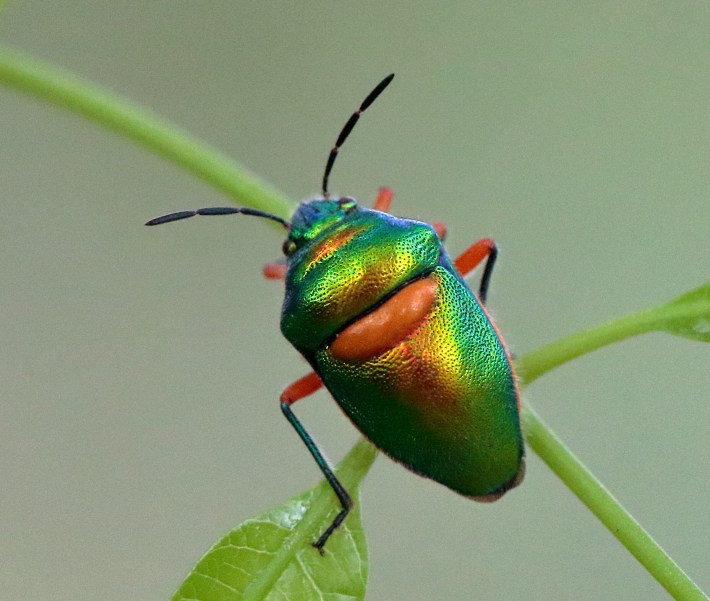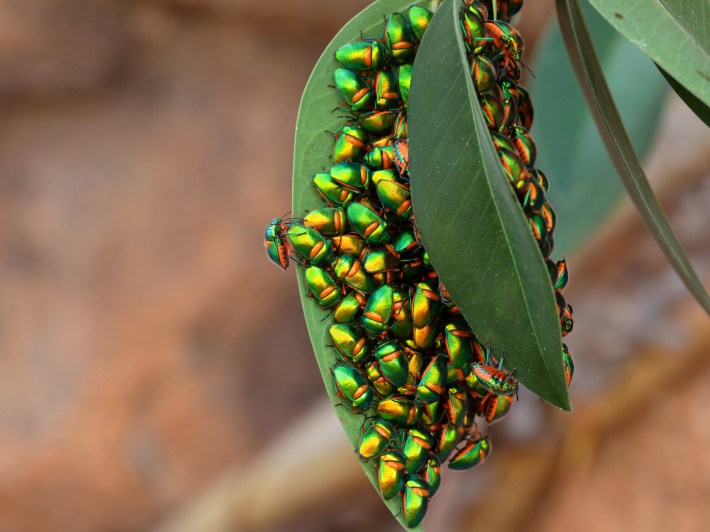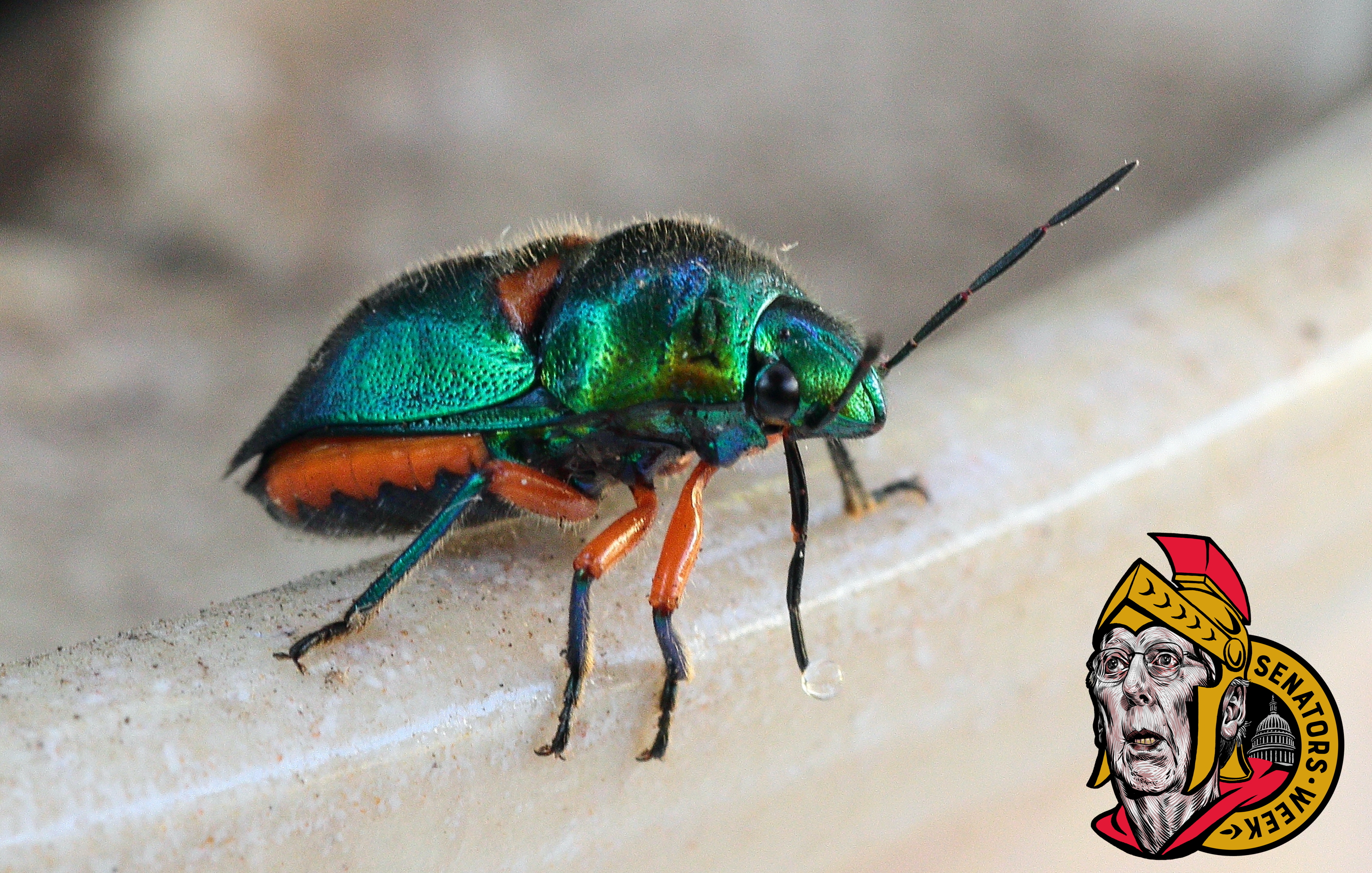This week, Defector has chosen to curate a collection of writing inspired by two entities that have had an indelible effect on North America: the upper house of the United States Congress and Eugene Melnyk’s pro hockey team. This is Senators Week.
Here's something a normal person would have every reason to learn, even if they'd never once in their life gone hunting desperately for a way of getting on board during a random, confounding theme week at their deranged place of business: There is a lovely little Australian bug, called the green jewel bug, that has the word "senator" in its scientific name. It's so important that you and all your friends learn about this bug, in particular if that learning requires that you read and share this blog!
Lampromicra senator was first named by a Danish entomologist in 1903. How this Scandinavian fellow found himself naming bugs in Australia, and why he decided to jam the word "senator" in there, is beyond the purview of this blog. Frankly, I couldn't find the information, and oh how I tried: The Australian parliament, which contains a senate, was founded in 1901. Maybe our guy was just freaking pumped about there being two elected chambers of the legislative branch of the newly independent government, and was determined to name the next new species he came across after one of them, and Lampromicra houseofrepresentativor seemed cumbersome. Anyway, this unnamed fellow gave a shiny little herbivorous "true bug" the only scientific name to include the word "senator" anywhere in the animal kingdom, and for that, those of us with half-mad editors holding loaded pistols to our foreheads must be truly grateful.

As a person with a deep interest in a family of bugs I had never heard of just 48 hours ago, I have long yearned to know all about the behaviors and characteristics of this, ah, Heteroptera species native to New South Wales and Queensland, places I could definitely point to on a globe on my first or seventh try, even without the use of a magnifying glass. But so little information is available about the green jewel bug! Wikipedia provides a whopping three total sentences on the topic of Lampromicra senator; the entry on the website of the Western Australia Museum is only slightly more informative, and includes intimidating words like "morphology," "scutellum," and "oblongifolia," which would require whole research expeditions of their own. Where could I, a sweaty blogger facing an utterly incomprehensible mandate, go to answer the important questions about the green jewel bug? The world needs to know: What is a "true bug"? What sort of filibuster powers do green jewel bugs enjoy as members of the upper house of parliament? How many jewel bugs would it take to defeat an unarmed but determined blogger in combat?
Finding an entomologist who will answer these questions is trickier than you'd think. It seems no one has much given a rip about the green jewel bug in the 118 years since it was first named. Luckily, after much searching and many unanswered emails, I came into contact with Dr. Isabelle Vea, visiting research assistant professor at the University of Illinois at Chicago. Vea is not an expert on Scutelleridae specifically, but she is an entomologist, and a sympathetic and good-humored one at that. With her help, I was able to dig down into the fascinating particulars of the shiny little hard-shelled beauty known as the green jewel bug. As it turns out, they're pretty interesting bugs! I am almost certainly now one of the world's leading experts on them. Ask me anything. Anything.
There is a whole category of what you or I might offhandedly refer to as "insects" that have evolved to slurp the sap out of plants for their dinner. These guys are called Hemiptera, and they include stink bugs, jewel bugs, and cicadas, which surely you have heard are preparing to emerge from the soil and conquer our nation's capital. Then there is a suborder within Hemiptera, a group of sap-slurping bugs that all have similar wings, called Heteroptera. Jewel bugs are of the Heteroptera suborder Scutelleridae, which means they have a big thoracic shield called a scutellum that covers their abdomen and wings while they slurp up their plant sap. Vea said jewel bugs, like the stink bugs to which they are closely related, are clumsy and slow-moving, even in flight, so the hard shell gives them a needed layer of protection against predators. That hard shell is, in many jewel bug species, brightly colored, which many predators will take as an indicator of poison. Jewel bugs are in fact not poisonous, but the bright colors are how they earned their name. Neat!
So they don't have poison. What they do have, and what they use as their main defense against predators, is the ability to produce a foul, offensive odor on command. Jewel bugs bunch together in shiny, bright little feeding clumps, and when they feel threatened the entire group will essentially fart in unison. Where the fart of one single jewel bug may be no more a deterrent than the mildly sulfurous smell of the overcooked hard-boiled egg I ate for breakfast this morning, the combined farts of 100 jewel bugs will overwhelm all but the most determined predators. When I asked whether I could use a fistful of farting jewel bugs to scare away a certain ravening blog editor, Vea was less confident. "You would need A LOT of jewel bugs," she said, and added that they would need to feel directly threatened by Samer, as they are "not offensive," and use the odor "only to defend themselves." Draft-dodging, unhelpful pacifists is what they are.

This rejection of violence means they are also woefully unsuited for the task of putting an exhausted blogger out of his misery once and for all. As such a person would contain very little leaf matter and nothing that could rightly be described as "sap," no conceivable mass of green jewel bugs—not even all the green jewel bugs in existence—could be counted upon to end my suffering. "If they are in large numbers and you start the offensive, they might destroy your sense of smell," Vea said. Terrific.
Do they at least have administrative powers? As senators, can green jewel bugs grant me Australian citizenship and then emergency asylum in the nearest Australian embassy? No, they cannot. Whatever legislative authority they may hold in bug society, Vea says green jewel bugs are quite powerless when it comes to matters of state. Maybe, she adds, the Danish fellow who named them "thought this bug could represent other jewel bugs in politics." Or maybe he was just a fan of a crummy hockey team. We may never know.





